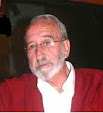José Ignacio López Soria
Published in: The
International Journal for Global and Development Education Research. Madrid
/ San José (Costa Rica), (10), 157-162, sept. 2016. Moderately improved version
with regards to the original that appeared in: Tarea. Education and culture
journal. Lima, no. 91, July 2016, pp. 72-75.
I met Alfonso
Ibáñez (Arequipa 1948, Guadalajara 2016) in 1979 in an old castle in Cerisy la
Salle, Normandy, which housed a prestigious cultural centre. This was the site
of a long (10 days) and lively discussion organised by the philosopher Michaël
Löwy to analyse and discuss, in a small group, the contributions by György
Lukács and Lucien Goldmann. Participants included Á. Heller, F. Fehér, N.
Tertulian, N. Rudich, Gy. Márkus, J. Gabel, M. Jiménez, L. Boella, V. Leduc, Z.
Tordaï, M. Ziemek, J.-L. Ferrier, S. Naïr and a few other scholars of the works
of Lukács and Goldmann. The presentations and discussions dealt with, among
other matters, the sociology of knowledge and literature, the transcendental
and transindividual subject, ontology, the theory of tragedy, historicism, the
hidden God, the dialectics of totality, artistic creation, the novel and women,
the problem of individuality and the theory of social classes. Löwy invited
three of his students, one of whom was Alfonso.
I am providing these details in order for the reader
to understand that while he studied theology at the Centre Sèvres (Jesuits) in
Paris and did his PhD in Philosophy at the Université Paris VIII, Alfonso
frequented circles of intellectuals who had a clear ethical and political commitment
to liberation. For everyone, the purpose was to think of the most successful
way of practically engaging in the implementation of justice. Those who came
from the “real socialism” of that time were also concerned with getting rid of the
“dictatorship of needs” (terminology of A. Heller) that hindered the full
deployment of human possibility.
Before this last stage of education, Alfonso received
his basic education at Colegio San José in Arequipa, his initial Jesuit
training and that on classical humanities in Huachipa (Lima) and his licentiate
degree in philosophy from the Pontifical Catholic University of Peru. During
his education, while taking advantage of windows that were half-open to alternative
thought and getting involved in community and popular education, Alfonso learned
not only to see the world from perspectives other than those that were
dominant, but also to ethically engage in what resulted from them for social
practice. I would go as far as to say -from what I discovered after Alfonso-
that this well-matched union between alternative theory and social practice led
Alfonso to take an ethical-philosophical stance that could not develop in any
other way than as a political stance.In light of this maceration, his original
religious vocation began to cool.
